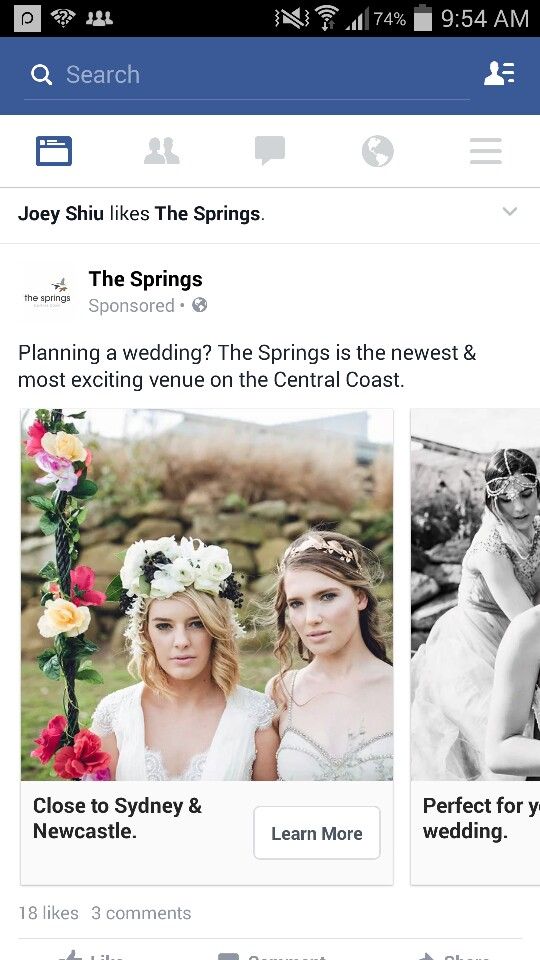
Even as e-commerce brands test out new platforms like TikTok and Twitch, Facebook advertising remains essential to any digital marketing strategy.
That is because of how sophisticated Facebook's ad targeting system is. Facebook knows so much about its nearly 3 billion users that it can help brands reach even niche communities that might embrace their product catalog.
Wedding brands, in particular, need to master targeted advertising and make it a part of their e-commerce marketing strategy in order to unlock new target audiences. People shop for weddings at a particular period of their lives.
Facebook remains better equipped than any other social media platform to figure out who is getting married—and what kinds of products or services they need.

Facebook lets brands and e-commerce stores send ads to users based on all sorts of personal demographics.
Age, location, gender, race, and estimated income are major categories, but Facebook also slices up its audience based on more niche descriptors or traits.
Under the Detailed Targeting section, Facebook lets brands choose from hundreds of keywords in the Facebook Ads Manager. Among the options is "Newly-engaged (6 months)" and "Friends of newly engaged people," both of which are key demographics for wedding brands.
Brands can also target Facebook users based on their passions, which Facebook synthesizes under the "Interests" category in its Ads Manager. Interests can be as broad as "beauty" or as specific as "kombucha."
A wedding brand might have an easy time targeting someone who has recently liked Facebook pages related to "plus-size wedding dresses" or "wedding rings."
It makes prospecting for your next Facebook campaign more manageable, and brands can even use Custom Audiences to access data captured by their Facebook Pixel and Facebook business pages.
For companies and e-commerce businesses that are new to using the Facebook Ads Manager, here are some beginner ad strategies to keep in mind:
One of the most valuable tools that Facebook offers its advertisers is a tracking system called the Facebook Pixel.
Essentially, the pixel is a piece of code that brands can add to their websites or online stores, and it keeps tabs on what customers do step-by-step: when customers click a product, add it to their cart, proceed to checkout, and more.
From there, brands can use it to send dynamic product ads to people who have already been to their site. When you view a product page on a brand website and then receive an ad on Facebook or Instagram for it later, that's the Facebook Pixel at work.

For brand awareness, your Facebook advertising strategy should vary depending on the type of audience you're trying to reach. So-called "cold" audiences are people who are likely not aware of your brand, meaning they haven't visited your website or clicked your product.
The best way to advertise to cold audiences is to target them based on their demographics and to create the following ad types or ad formats that explain what your service does:
For wedding bands, the ideal cold ad will reach newly engaged people who might not yet know what types of solutions are out there for them in the wedding industry.

The corollary to cold audiences is "warm" audiences. These are the people who know
your brand, and who might even have visited your website but who have not made a purchase.
The Facebook Pixel will help to locate and retarget people who have already been to your website, like cart abandoners, for instance.
While ad sets for cold audiences are focused on education, brands should retarget or remarket warm audiences with a discount offer or some other nudge to convert the sale.
A wedding dress brand, for instance, might use Facebook ads to warm audiences, promoting a flash sale.

Brands unsure where their next customer should come from have begun creating Lookalike Audiences through the Facebook Ads Manager. Essentially, Lookalike Audiences uses an algorithm to reach people similar to pre-existing customers.
Brands can upload the email addresses or phone numbers of existing customers, and Facebook will use those to reach possible new customers from the same background and demographics.
This, essentially, does the optimization of your e-commerce Facebook ad campaign for you.
Customers often leave comments under-promoted posts or ads on Facebook and Instagram. If those comments go unanswered, especially negative testimonials, it can leave viewers of your ad with a bad impression.
Chatdesk Teams provides knowledgeable customer support teams who respond to customers on the Facebook and Instagram Ad comments, improving customer experience and driving conversion rates. Schedule a demo here to see it in action.